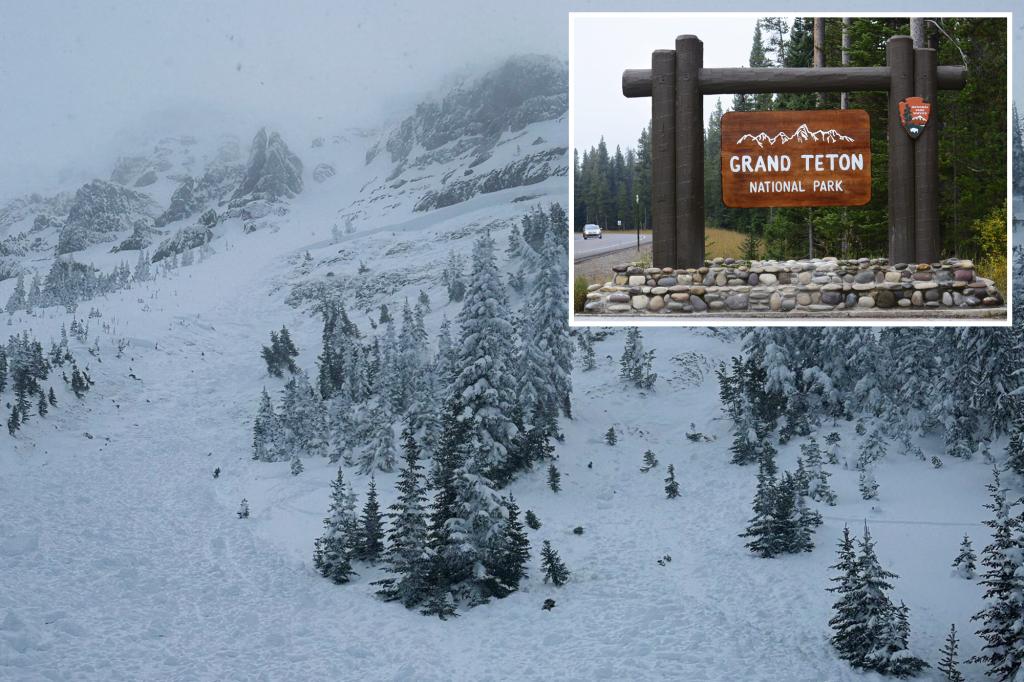On a somber Saturday, the tranquility of Wyoming’s backcountry was shattered by a devastating avalanche that claimed the life of a skier and left another injured. A group of four adventurers were ascending the remote slopes of Togwotee Pass, their skis gliding along a pre-established skin track, when the mountainside suddenly unleashed its fury. The immense wall of snow roared down, engulfing 36-year-old Kenneth Goff of Lander, Wyoming, and partially burying another member of the group. This tragic incident marked the fifth avalanche fatality of the winter season, a stark reminder of the inherent risks associated with backcountry exploration.
The remote and challenging terrain of Togwotee Pass significantly complicated rescue efforts. Teton County Search and Rescue (TCSAR) initially attempted to deploy both helicopters and snowmobiles to reach the avalanche site, but adverse weather conditions rendered these options impossible. A determined team of rescue skiers was then assembled, embarking on a strenuous trek through the unforgiving landscape. The rescuers battled against the elements and difficult terrain for nearly four hours before finally reaching the scene of the avalanche, a testament to their dedication and resilience in the face of adversity.
Upon arrival, the rescue team immediately focused on locating and extricating the buried skiers. Tragically, Kenneth Goff was found deceased, a victim of the immense force of nature. The other partially buried skier, who had sustained a leg injury, was carefully extracted and stabilized. As darkness descended, the rescuers worked tirelessly to transport the injured skier down the mountain in a litter. Upon reaching the base, the injured skier was swiftly transferred to a waiting ambulance from Grand Teton National Park, located approximately 20 miles from the avalanche site, and transported for medical care. The body of Kenneth Goff was also recovered and transported from the mountain using a specialized rescue sled.
The challenging rescue operation underscored the importance of thorough planning and preparation for backcountry adventures. TCSAR emphasized the significant delays that can occur when helicopter support is unavailable due to weather conditions, urging backcountry enthusiasts to factor this into their risk assessments. The extended rescue time in this incident highlighted the need for self-sufficiency and the ability to cope with unexpected delays in remote and unpredictable environments. TCSAR expressed their deepest condolences to the family and friends of Kenneth Goff, acknowledging the profound loss and the devastating impact of this tragedy.
The avalanche occurred amidst a period of severe winter weather that had gripped much of the country, including Wyoming. A series of snowstorms had blanketed the region in recent weeks, creating unstable snowpack conditions that heightened the risk of avalanches. The National Weather Service had issued warnings about the potential for avalanches in the area, emphasizing the importance of caution and awareness for anyone venturing into the backcountry. The combination of heavy snowfall and fluctuating temperatures likely contributed to the instability of the snowpack, making it more susceptible to slides. This tragic incident serves as a somber reminder of the power of nature and the importance of respecting the inherent dangers of backcountry terrain, particularly during periods of adverse weather.
The death of Kenneth Goff in the Togwotee Pass avalanche serves as a tragic reminder of the inherent dangers of backcountry skiing. While the allure of pristine slopes and untouched powder can be irresistible, it is crucial to prioritize safety and make informed decisions based on current conditions. Thorough planning, including checking avalanche forecasts, carrying appropriate safety equipment, and possessing the necessary skills and knowledge to assess risks, are essential for mitigating the dangers of backcountry travel. The tragic loss of life underscores the importance of respecting the power of nature and recognizing that even experienced backcountry skiers can become victims of unforeseen events. This incident serves as a poignant call for increased awareness and education regarding avalanche safety and the importance of making responsible choices in the backcountry.

